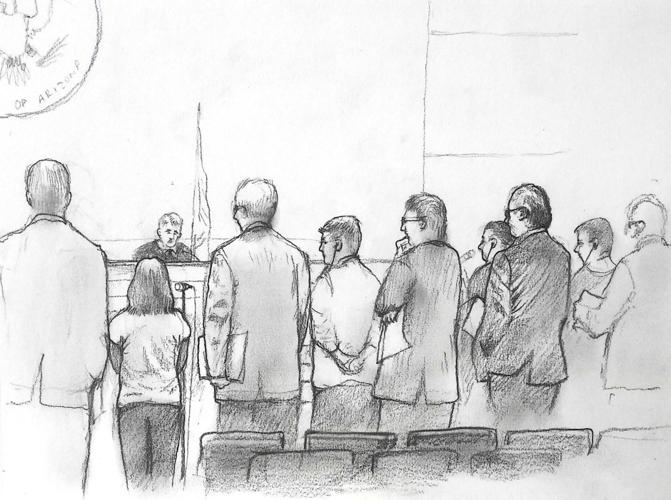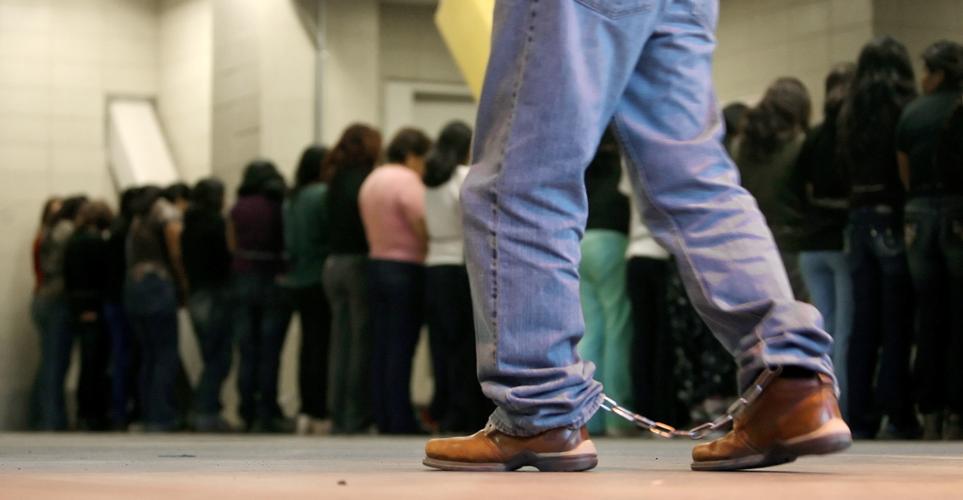As Attorney General Jeff Sessions pushes for zero-tolerance for illegal border crossers, Southern Arizona already has seen a 71 percent spike in those prosecutions.
About 8,500 border-crossing prosecutions went through Operation Streamline, a fast-track program that handles the bulk of such prosecutions in Southern Arizona, from Oct. 1, 2017, through April 19, according to U.S. District Court calendars compiled by the Arizona Daily Star. During the same period in fiscal 2017, about 5,000 prosecutions went through Streamline.
The sharp increase comes despite border-crossing arrests remaining relatively flat in Southern Arizona, Border Patrol records show. Agents in the Tucson Sector made about 26,300 apprehensions from the start of the fiscal year on Oct. 1 through the end of March, a 9 percent increase over 24,200 apprehensions during the same period in fiscal 2017.
During pauses in the Streamline proceedings on April 19, defense lawyers said they were seeing the number of Streamline cases rise to what it was several years ago, largely due to the increase in prosecutions of first-time border crossers.
In April 2017, Sessions sent a memorandum to federal prosecutors directing them to prioritize first-time offenders, among other border-related crimes. On April 6, he sent another memo to prosecutors along the U.S.-Mexico border specifically directing them to “adopt immediately a zero-tolerance policy” for first-time offenders “to the extent practicable.”
After the April 2017 memo, prosecutions of first-time crossers restarted in Tucson. Court calendars show zero such prosecutions in fiscal 2017 prior to May 22, 2017. Since then, calendars show about 5,700 Streamline prosecutions of first-time crossers in Tucson, including about 3,600 since October.
“Since June 2017, at the directive of AG Sessions, Tucson Sector Border Patrol has been presenting first-time offenders illegally crossing the border for criminal prosecution,” the sector’s public affairs office said in response to an inquiry from the Star. “With this change, more people are being presented for prosecution under Operation Streamline.”
When asked whether all first-time offenders will be sent to Streamline under Sessions’ zero-tolerance approach, the Tucson Sector said each case is evaluated separately and not all first-time offenders go through Streamline.
Streamline is held most weekdays on the second floor of the federal courthouse in downtown Tucson. Repeat border crossers plead guilty in the morning to a misdemeanor charge in exchange for having a felony charge dropped. In the afternoon, they are sentenced to up to six months in federal prison.
First-time illegal border crossers also plead guilty to a misdemeanor and are sentenced the same day. They usually are sentenced to time served, but the conviction raises the potential consequences if they are caught illegally crossing again.
On April 19, a handful of border crossers saw their cases dismissed, a common occurrence for people who turn out to be minors or who speak indigenous dialects instead of Spanish and the court does not have an interpreter for them.
Several lawyers told the judge after their clients were sentenced that their clients feared returning to their home countries, such as Honduras.
The program has been controversial since its inception in 2005 in Texas, with critics calling it assembly-line justice that violates defendants’ due-process rights.
Proponents say criminal prosecutions are necessary to deter illegal border crossings. Migrant advocates say the fear of prison sentences leads migrants to risk their lives by crossing the border in remote and dangerous areas.
Federal appeals courts have agreed with some of the criticisms. When Streamline proceedings began in Tucson in 2008, about 70 shackled border crossers pleaded guilty in unison. Now, groups of seven unshackled border crossers appear before the judge and each speaks to the judge individually.
But fundamental aspects of the program, such as the quick turnaround from guilty plea to sentencing and the few minutes lawyers have to consult with their clients, remain unchanged.
The U.S. Attorney’s Office and the Border Patrol have declined repeatedly in the past to provide basic statistics on Streamline. The U.S. Attorney’s Office did not respond to a request for comment on the increase in Streamline prosecutions.





